OBSOLETE
Please see the new Blaze color range of instruments for the Velocity replacement
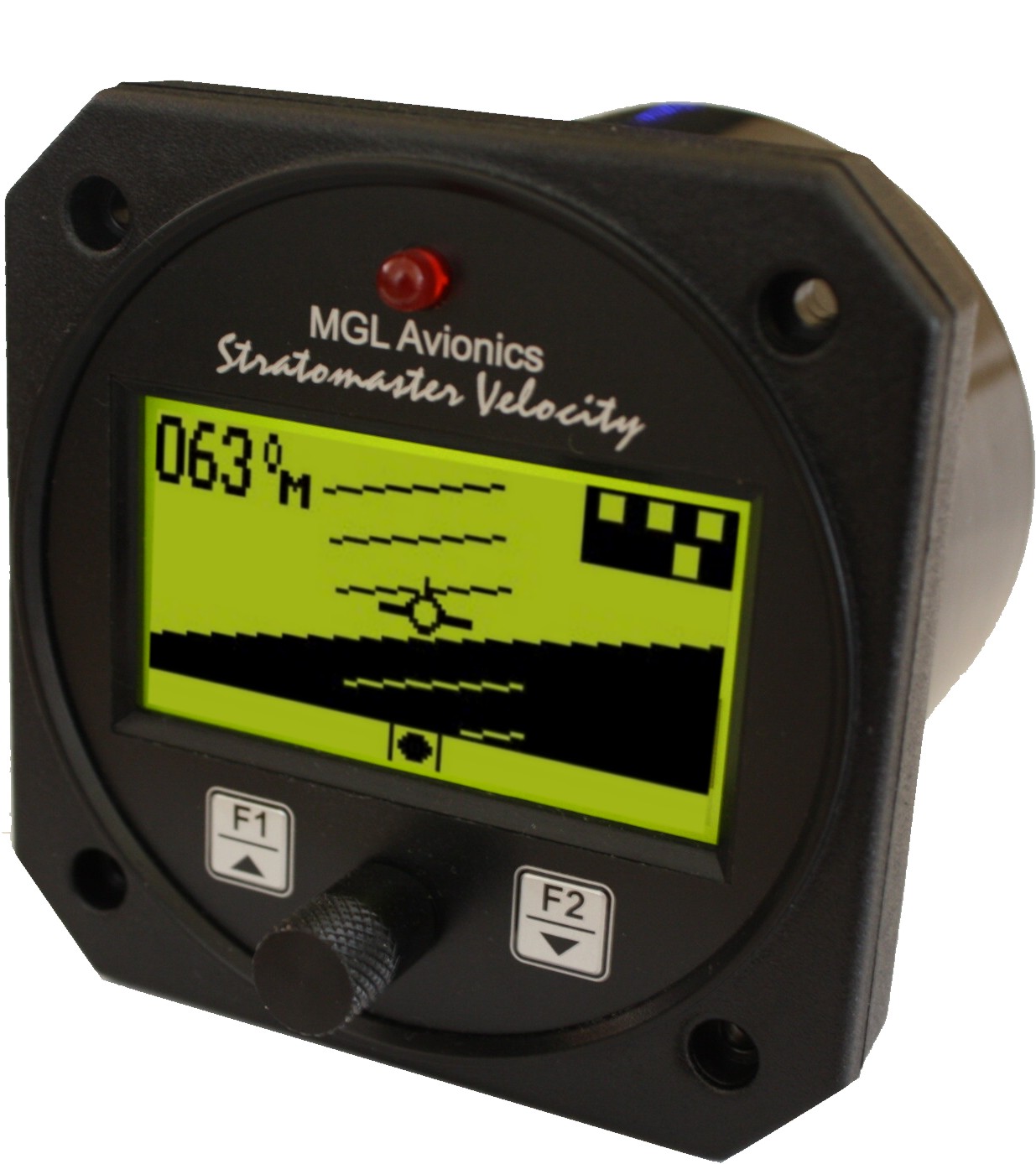
The Stratomaster Velocity range consists of sixteen 3 1/8" microprocessor based instruments.
Using a custom made, high resolution graphics display, these instrument provide excellent daylight readability, even in direct sunlight. In addition they all have built in backlighting making them easy to read at night time.
It includes a rotary control plus 2 independent keys for easy menu navigation and to access specific instrument features.
The Velocity range also has a wide supply voltage range of 8 to 30V DC with with built in reverse and over voltage protection.
The Velocity series features
- Standard 3 1/8” aircraft enclosure (Can be front or rear mounted)
- Rotary control plus 2 independent buttons for easy menu navigation and user input
- Alarm output as well as a red LED illuminates for alarm notification
- Large backlit graphic LCD with adjustable contrast
- Multiple display screens (model dependent)
- On board voltage reversal and over voltage protection for harsh electrical environments
- Wide supply voltage range (8 to 30V DC)
- Light weight design
- Field upgradeable firmware
- 1 year limited warranty
ALT-3 (Precision aviation altimeter and Vertical Speed Indicator)
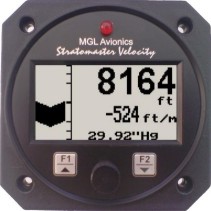
Latest Firmware Revision: 2.00
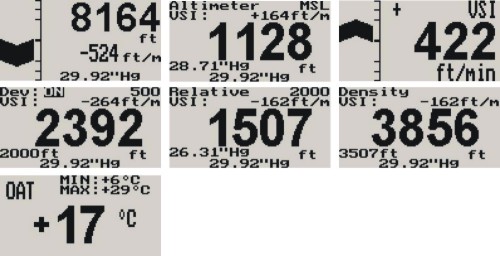
The ALT-3 is a 3 1/8” instrument that contains a precision altimeter and a wide range vertical speed indicator. The altimeter conforms to ANSI standard atmosphere rules from –1000 ft up to a maximum of 30 000 ft. The altimeter can display altitude in feet or meters, local pressure can be set in millibars or inches of mercury
The onboard VSI
indicator is altitude compensated and can be displayed in either
feet/minute (ft/min) or meters/second (m/s). It also offers a digital
readout with a wide range from +/-20 ft/min to as high as +/-10 000
ft/min, it also offers a logarithmic analog display with a +/-2000 ft
range. The VSI can be calibrated by the user once the instrument has been
installed in the aircraft.
In addition the ALT-3 provides an OAT sender which is used in determining the density altitude of the aircraft. The ALT-3 can also be used to measure relative altitude and it has a facility for the pilot to enter a reference altitude and deviation band that has to be kept.
-
Precision altimeter from –700 ft up to a maximum of 30 000 ft (-213m to 9144m)
-
The altimeter can display altitude in feet or meters, local pressure can be set in millibars or inches of mercury
-
Contains a wide range VSI indicator from +/-20 ft/min to as high as +/-10 000 ft/min
-
VSI units can be in feet/minute (ft/min) or in meters/second (m/s)
-
Records the maximum and minimum OAT (outside air temperature) and maximum altitude reached in permanent memory
-
Records maximum and minimum OAT in temporary memory since instrument power up
ALT-4 (Encoding aviation altimeter with a transponder compatible Serial RS232 & Parallel Gillham code output )

Latest Firmware Revision: 2.00

The ALT-4 is a 3
1/8” instrument that contains a precision encoding altimeter and a wide
range vertical speed indicator. The altimeter conforms to ANSI standard
atmosphere rules from –1000 ft up to a maximum of 30 000 ft. The altimeter
can display altitude in feet or meters and local pressure can be set in millibars or inches of mercury. The ALT-4 also provides a transponder
compatible Serial RS232 and parallel gillham code output.
The onboard VSI indicator is altitude
compensated and can be displayed in either feet/minute (ft/min) or
meters/second (m/s). It also offers a digital readout with a wide range
from +/-20 ft/min to as high as +/-10 000 ft/min, it also offers a
logarithmic analog display with a +/-2000 ft range. The VSI can be
calibrated by the user once the instrument has been installed in the
aircraft.
In addition the ALT-4 provides an OAT sender which is used in determining the density altitude of the aircraft. The ALT-4 can also be used to measure relative altitude and it has a facility for the pilot to enter a reference altitude and deviation band that has to be kept.
-
Precision altimeter from –700 ft up to a maximum of 30 000 ft (-213m to 9144m)
-
Provides a transponder compatible Serial RS232 and parallel gillham code output.
-
Built in encoder test functions
-
The altimeter can display altitude in feet or meters, local pressure can be set in millibars or inches of mercury
-
Contains a wide range VSI indicator from +/-20 ft/min to as high as +/-10 000 ft/min
-
VSI units can be in feet/minute (ft/min) or in meters/second (m/s)
-
Records the maximum and minimum OAT (outside air temperature) and maximum altitude reached in permanent memory
-
Records maximum and minimum OAT in temporary memory since instrument power up
ASI-3 (Airspeed indicator (ASI) with automatic flight log)
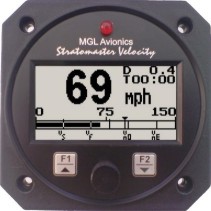
Latest Firmware Revision: 2.00
The ASI-3 airspeed indicator is a 3 1/8” instrument that provides a wide range airspeed indication in both digital and analog formats. Airspeed is based on the pressure generated by a pitot tube system and a static port is provided as well for use by high speed aircraft. In addition, the ASI-3 provides a 24 entry automatic flight log that stores the duration of each of the last 24 flights, an air-distance trip counter and a current flight timer.
Airspeed can be indicated in statute miles per
hour (mph), kilometers per hour (km/h) or nautical miles per hour (knots)
with the air-distance being displayed in corresponding units. The analog
airspeed display can be scaled according to the aircraft’s flying speed
range and markers for Vs, Vf, Vno and Vne can be set. ASI sensitivity can
be calibrated by the user to cater for errors caused by pitot tube
placement.
The ASI-3 instrument measures airspeed from 16mph to 250mph and is well suited to slower aircraft due to very good sensitivity and linearity at low air speeds.
-
Measure airspeed from 16mph to 250mph and is well suited to slow aircraft due to very good sensitivity and linearity at low air speeds
-
Includes a 24 entry automatic flight log
-
Includes an air-distance trip counter and a flight timer
-
Airspeed units can be set to miles per hour (mph), kilometer per hour (km/h) or nautical miles per hour (knots)
-
Contains a programmable low/high airspeed alarm
-
Records maximum airspeed reached in permanent memory
-
Analog bar graph indicating airspeed with markers for Vs, Vf, Vno and Vne
ASX-2 (Encoding aviation altimeter with serial output and airspeed indicator)
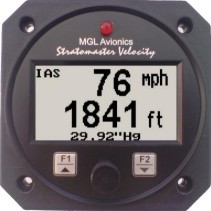
Latest Firmware Revision: 2.00
The ASX-2 altimeter/airspeed combo is a 3 1/8” instrument based on a precision altimeter and a wide range, sensitive airspeed indicator. The altimeter conforms to ANSI standard atmosphere rules from –1000 ft up to a maximum of 30 000 ft.
The altimeter includes an encoding serial
output that, when used in combination with MGL Avionics CNV-AT, provides a
parallel Gillham code interface for transponders. The altimeter can
display altitude in feet or meters. Local pressure can be set in millibars
or inches of Mercury.
The airspeed indicator can show air speeds
from 16 to 250 mph and is well suited for use in slow aircraft due to very
good sensitivity and linearity at low air speeds. The airspeed indicator
as well as altimeter can interface to a static port and the airspeed
indicator is based on a standard aviation pitot tube. The airspeed
indicator can be set to indicate speeds in statute miles per hour (mph),
kilometers per hour (km/h) or nautical miles per hour (knots) with the
air-distance being displayed in corresponding units. The airspeed
sensitivity can be calibrated by the user to cater for errors caused by
pitot tube placement. The ASX-2 also outputs airspeed information via the
airtalk protocol for interfacing to the Infinity FF-1/Velocity FF-3 (fuel
flow computer) and the SP-X (AHRS) instruments.
In addition the ASX-2 provides a 24 entry automatic flight log that stores the duration of each of the last 24 flights, an air-distance trip counter and a current flight timer. The ASX-2 is the ideal instrument for installations where panel space is limited.
-
Precision altimeter from –700 ft up to a maximum of 30 000 ft (-213m to 9144m)
-
Provides a parallel Gillham code interface for transponders when used in combination with the MGL Avionics CNV-AT
-
The altimeter can display altitude in feet or meters. Local pressure can be set in millibars or inches of Mercury
-
Airspeed ranges from 16 to 250mph and is well suited to slow aircraft due to very good sensitivity and linearity at low air speeds. Airspeed can be displayed as IAS or a calculation based TAS
-
Includes a 24 entry automatic flight log
-
Includes an air-distance trip counter and a flight timer
-
Airspeed units can be in miles per hour (mph), kilometer per hour (km/h) or nautical miles per hour (knots)
-
Contains a programmable low/high airspeed alarm
-
Records maximum airspeed and altitude reached in permanent memory
AV-2 (Artificial horizon and advanced magnetic compass indicator)
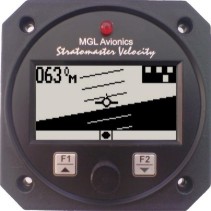
Latest Firmware Revision: 2.00
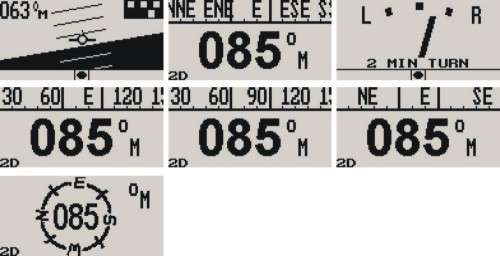
The AV-2 is a 3 1/8” instrument that can be used as a
display interface for an artificial horizon reference system (AHRS), an
advanced digital compass, or both depending on which MGL Avionics sensor
packages is connected to the AV-2.
The AV-2 can be setup to display the following:
-
Compass with five different displays (requires MGL Avionics SP-2/6 sensor package)
-
Horizon with or without slip indicator (requires MGL Avionics SP-3/4/5/7 sensor package)
-
Turn and bank indicator (requires MGL Avionics SP-3/4/5/7 sensor package)
-
Combined compass and horizon display with bank indicator and optional slip indicator (requires MGL Avionics SP2/6 & SP-3/4/5/7 sensor package)
You can also share sensor packages between various different sizes of instrument e.g. Infinity 2 1/4” AV-1 units. For example you may want a 3 1/8” horizon display but a 2 1/4” compass/turn and bank indicator.
-
Artificial horizon reference system (AHRS) display unit with slip indication as well as turn and bank indication
-
Advanced magnetic compass with course steering feature
-
Can be setup as an individual compass display, artificial horizon or both
-
The AV-2 is connected to the sensor packages by a simple 2 wire communication link. This allows for the optimum placement of the sensor package in the aircraft
-
More then one AV-2 can be connected onto an airtalk link. This allows the compass, artificial horizon and the turn and bank indicator to be displayed on different AV-1/2 units
E-1 (Universal engine monitor)

Latest Firmware Revision: 2.00
The E-1 universal
engine monitor combines in one compact 3.125” format instrument all that
is needed to monitor the majority of smaller aircraft engines from
two-stroke ultra-light engines to medium sized four strokes such as those
from Rotax, Continental and Lycoming. Most automotive engine conversions
can also benefit from the use of the E-1 engine monitor.
The E-1 can measure up to 4 EGT/CHT channels, a universal RPM input, a universal temperature sender input, a universal pressure sender input and the aircrafts supply voltage.
-
66 different engine setup configurations possible
-
Universal, programmable rev counter (engine RPM) with digital and analog readout, with a programmable high alarm limit
-
Programmable engine Hobbs meter (password protected) and running timer (flight timer) with automatic flight log
-
Can monitor up to four programmable thermocouple channels for EGT and CHT probes with a user programmable high alarm limit
-
A universal temperature sender input with a user programmable low and high alarm limits
-
A universal pressure sender input with a user programmable low and high alarm limits
-
Supply voltage measurement up to 30V with a user programmable low and high alarm limits
-
Maximum recorded values for all measured values are stored in non-volatile memory
-
High accuracy: Built in thermocouple linearization curves and cold junction compensation
-
Thermocouple temperature probes can be common K, J or E-type thermocouple probes
-
Uses standard automotive temperature and pressure senders
-
Special Rotax 912/914 engine monitor mode utilizing the standard built in Rotax NTC CHT probes
-
Supports the new Rotax 912/914 4-20mA oil pressure sender
FF-3 (Fuel Management System)
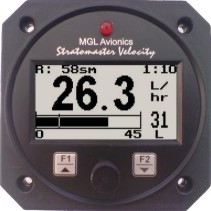
Latest Firmware Revision: 2.00
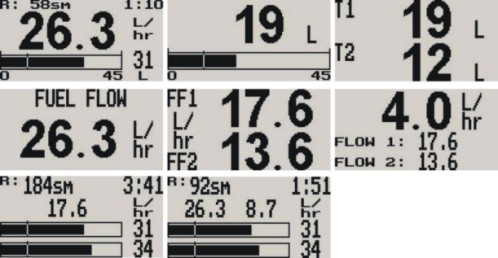
The FF-3 fuel
management computer is a 3 1/8” instrument intended for efficient
monitoring of fuel related information for single or dual fuel tanks
onboard small aircraft and related applications.
The FF-3 unit can connect to one or two fuel
flow senders, one or two fuel level senders or both. Full functionality is
available with both senders or only with a fuel flow sender using
calculated fuel levels based on fuel usage. Differential fuel flow
calculations are also supported for fuel return systems. Fuel injector
systems are also supported. Standard automotive fuel level senders can be
used, even with odd shaped tanks due to a comprehensive, multi-point
calibration system. Most fuel flow senders can be used and the K-factor of
the sender can be entered into the system for simple calibration. MGL
Avionics supplies a lightweight dual range fuel flow sender that is
ideally suited for the FF-3.
In addition, the FF-3 can use the airspeed (via the airtalk cable connected to a Infinity ASI-1/ASX-1, Velocity ASI-3/ASX-2 indicator) or actual ground speed (by using the optional GPS NMEA interface cable connected to a RS232 NMEA enabled GPS receiver) to determine fuel range.
-
Advanced fuel computer with 17 different modes of operation
-
Supports single or dual fuel tanks
-
The FF-3 can connect to one or two fuel flow senders, fuel level senders or fuel injectors
-
Differential fuel flow calculations are also supported for fuel return systems
-
The FF-3 has the ability to connect to an ASI-1/ASX-1 or a NMEA enabled GPS receiver for range based calculations. It can also accept a manually entered estimate cruising speed if an ASX-1/GPS is not available.
-
Standard automotive fuel level senders can be used, even with odd shaped tanks due to a comprehensive, multi-point calibration system
-
Bilingual support (English and French)
The Infinity FF-1 / Velocity FF-3 and Flight-2 has the ability to be connected to a NMEA enabled RS232 GPS receiver to allow the use of actual ground speed in determining the fuel range (See the relevant instrument manual for more information).
The NMEA enabled RS232 GPS receiver must be able to output a GPRMC message (The Recommended Minimum sentence defined by NMEA for GPS/Transit system data).
FLIGHT-2 (Primary Flight Instrument)
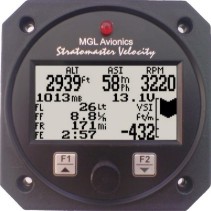
![]() FLIGHT-2 Manual (Revision
1.02)
FLIGHT-2 Manual (Revision
1.02)
Latest Firmware Revision: 2.00
The Flight-2 is a compact, multifunction complete primary flight system intended as a main flight instrument on smaller aircraft or as a backup / secondary flight instrument in larger aircraft. This 3 1/8” instrument provides many functions from an altimeter, airspeed indicator, fuel level and flow, engine RPM and many secondary functions, including an automatic flight log. The Flight-2's light weight, small size and high level of functionality makes it an excellent choice for many applications.
The Flight-2 makes an ideal companion to the Velocity E-1 universal engine monitor for a compact, low cost yet highly functional and complete cockpit solution.
-
Altimeter (–700ft (-213m) to 30 000ft (9144m)). Altitude can be displayed in feet or meters. Local pressure can be set in mbar or in “Hg.
-
Airspeed indicator (16mph to 250mph).
-
Altitude compensated digital VSI indicator (+/-20 ft/min to +/-10 000 ft/min) and a logarithmic analog VSI indicator (+-2000 ft/min range). VSI can be displayed in ft/min or m/s.
-
Automatic flight duration timer
-
Fuel flow (optional fuel flow sender). Fuel flow can be displayed in liters or Gallons.
-
Fuel level calculated from fuel flow or from a fuel level sender
-
Multi point fuel level sender calibration to compensate for odd shaped tanks and nonlinear fuel level senders
-
Current range estimate (range at current speed and fuel burn). Can be displayed in statute/nautical mile or in kilometers
-
Fuel bingo estimate (time until tank empty)
-
Universal RPM counter (0 to 20000RPM)
-
Real Time Clock (RTC) for local time and flight log use
-
Settable Hobbs meter (password protected)
-
Programmable Maintenance timer for scheduled routine engine maintenance
-
OAT (Outside air temperature) display using an external sensor
-
Supply Voltage display
-
Density altimeter
-
Barometer (actual local pressure)
-
True airspeed (TAS display)
-
Fuel range based on TAS, IAS or GPS-NMEA input
-
Fuel endurance based on TAS, IAS or GPS-NMEA input
-
Stopwatch
-
Glide and climb ratio indicator
-
Alarm on low/high RPM, low/high airspeed, low/high supply voltage and low fuel level
-
Records maximum values reached in permanent memory
-
Includes a 24 entry automatic flight log
GF-2 (+- 10G Tilt compensated dual range G-force meter)
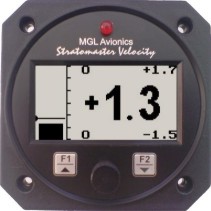
Latest Firmware Revision: 2.00
The GF-2 is a 3 1/8” G-force meter capable of measuring G-forces exerted in an aircraft up to +-10g. The forces acting on the aircraft are easily seen on a large backlit graphic display both numerically and graphically.
The GF-2 also has the facility to record maximum G-forces obtained in permanent memory as well as a temporary memory to record G-forces reached from the time of power up. It also features 2 independent cycle counters to capture the amount of times a preset force has been exceeded.
The GF-2 is able to measure G-forces even if the instrument is not mounted exactly on the vertical axis of the aircraft.
-
Typical, accurate range up to 20g (from -10g to +10g)
-
Records maximum measured forces in permanent memory (both positive and negative G-forces), with password protected reset facility
-
Two independent cycle counters record the number of times a preset force has been exceeded
-
Temporary memory for maximum positive and negative G-forces encountered (typically during a flight)
-
Clear, large readable G-force numerical value (10g positive and negative)
-
Scalable graphic analog display of force acting on the aircraft
-
2 axis design of the instrument allows mounting in sloped panels (i.e. panel not exactly vertical)
-
Quick calibrations function for operation at temperature extremes using Earth’s gravity
-
Bilingual support (English or French)
MAP-2 (Universal Pressure and RPM indicator)
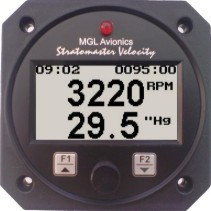
Latest Firmware Revision: 2.00

The MAP-2 is a 3 1/8” instrument which can measure pressures in the range of 0.25 bars (3.6 PSI) to 2.5 bars (36.2 PSI) as well as simultaneously display RPM from a universal RPM input.
Pressure can be displayed in millibar, bar, PSI, kg/cm2, inches of Mercury, millimeters of Mercury, kilopascal (KPA) or atmospheres. The pressure display is also available in the form of an analog bar graph with user selectable sensitivity if the RPM input is not needed. The MAP-2 is primarily intended as a manifold pressure gauge, however, due to the universal nature of this accurate instrument it can be used for many other applications as well.
In addition the MAP-2 provides a 24 entry automatic flight log that stores the duration of each of the last 24 flights. It also has a Hobbs meter (can be set to the current engine time) which is password protected, an engine running timer/flight timer and a programmable maintenance timer to schedule routine engine maintenance.
The MAP-2 also features a programmable low/high alarm for pressure as well as for RPM and it also records the maximum Pressure and RPM reached in permanent memory.
Typical applications include:
Engine manifold pressure, turbo boost pressure, barometer, fuel or oil pressure gauge (with additional isolation kit), pressure reference or airfoil research and testing
-
Universal pressure and RPM indicator
-
Can Measures RPM from 0 to 20000 RPM
-
Can measure pressures in the range of 0.25 bars (3.6 PSI) to 2.5 bars (36.2 PSI)
-
Pressure can be displayed in millibar, bar, PSI, kg/cm2, inches of Mercury, millimeters of Mercury, kilopascal (KPA) or atmospheres
-
Contains a programmable low/high Pressure and RPM alarm
-
Records maximum pressure and RPM reached in permanent memory
-
Includes a 24 entry automatic flight log
-
Includes a settable Hobbs meter (password protected) and an engine running timer/flight timer
-
Contains a programmable maintenance timer for scheduled routine engine maintenance
-
Scalable analog pressure bar graph
ROTOR-1 (Dual Rotor / Engine Tachometer)
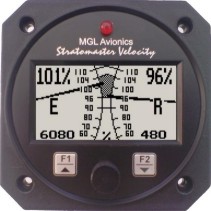
![]() ROTOR-1 Manual (Revision
1.01)
ROTOR-1 Manual (Revision
1.01)
Latest Firmware Revision: 2.00

The Rotor-1 dual rotor / engine tachometer is a 3 1/8” instrument providing two universal RPM inputs that is primarily intended to measure rotor and engine RPM. Typical uses are rotor / engine RPM displays for helicopters and gyroplanes.
The Rotor-1 displays rotor
and engine RPM in a digital readout as well as in a traditional scalable
analog needle display. In addition the Rotor-1 provides a 24 entry
automatic flight log that stores the duration of each of the last 24
flights. It also has a Hobbs meter (can be set to the current engine time)
which is password protected, an engine running timer/flight timer and a
programmable maintenance timer to schedule routine engine maintenance.
The Rotor-1 also features a programmable rotor and engine RPM low / high alarm as well as it records the maximum RPM values reached in permanent memory.
-
Dual rotor / engine tachometer
-
Dual digital readouts or a traditional scalable analog needle display
-
Includes a 24 entry automatic flight log
-
Includes a settable Hobbs meter (password protected) and an engine running timer/flight timer
-
Contains a programmable engine and rotor low / high RPM alarm
-
Contains a programmable maintenance timer for scheduled routine engine maintenance
-
Records maximum rotor and engine RPM reached in permanent memory
RTC-1 (Aviation UTC Real Time Clock ,OAT and voltage display)
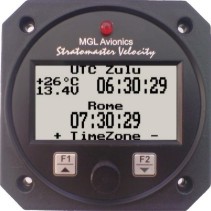
Latest Firmware Revision: 2.00
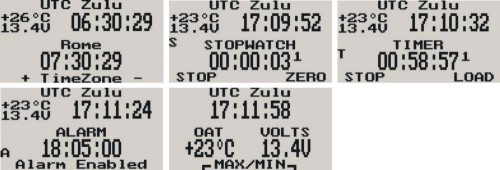
The RTC-1 is a 3 1/8” aviation Real Time Clock featuring a two time zone system, stopwatch, countdown timer, alarm, OAT (Outside Air Temperature) and Voltage display. It is primarily intended to show UTC time (also known as Greenwich Mean Time, GMT or Zulu time) together with a local time to facilitate ordinary ATC time reporting.
Each time zone may be programmed with an additional hour offset to allow for summer time or similar variances. Local offsets may be added or subtracted. Stopwatch and timers can be operated simultaneously to a programmable alarm, making the RTC-1 particularly suitable for sport flying competitions.
The RTC-1 can also display OAT in either degrees Celsius or degrees Fahrenheit, as well as can measure voltages up to 30V DC with a programmable low and high voltage alarm.
Time is maintained by an internal lithium battery which can be replaced by the user.
-
Features a 2 time zone system, stopwatch, countdown timer, alarm, OAT (outside air temperature) and voltage display
-
Stopwatch and timers can operate simultaneously to a programmable alarm
-
Local time offsets can be added or subtracted e.g. summer time or similar variances
-
OAT can be displayed in degrees Celsius or degrees Fahrenheit
-
Can measure voltages up to 30V (compatible with both 12V and 24V aircraft supplies)
-
Contains a programmable low/high voltage alarm to automatically alternator failures , bad batteries, etc.
-
Records maximum and minimum OAT and maximum Voltage reached in permanent memory
-
Replaceable lithium battery
(Universal engine RPM and rotor RPM indicator)
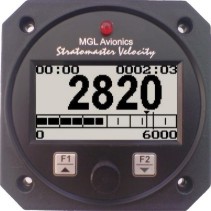
Latest Firmware Revision: 2.00

The RV-3 universal engine RPM and rotor RPM unit is a 3 1/8” instrument providing a universal RPM counter that can be adapted to a variety of roles. Typical uses are engine RPM displays or helicopter and gyroplane rotor RPM displays.
The RV-3 displays RPM in a digital readout as well as in a scalable analog bar graph display. In addition the RV-3 provides a 24 entry automatic flight log that stores the duration of each of the last 24 flights. It also has a Hobbs meter (can be set to the current engine time) which is password protected, an engine running timer/flight timer and a programmable maintenance timer to schedule routine engine maintenance.
The RV-3 also features a programmable RPM low/high alarm as well as it records the maximum RPM reached in permanent memory
-
Measures RPM from 0 to 20000 RPM
-
Includes a 24 entry automatic flight log
-
Includes a settable Hobbs meter (password protected) and an engine running timer/flight timer
-
Contains a programmable low / high RPM alarm
-
Contains a programmable maintenance timer for scheduled routine engine maintenance
-
Records maximum RPM reached in permanent memory
-
Scalable analog bar graph indicating RPM
TC-2 (One to four channel thermocouple temperature display)
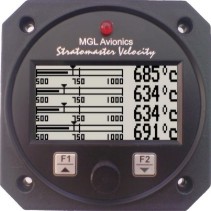
Latest Firmware Revision: 2.00
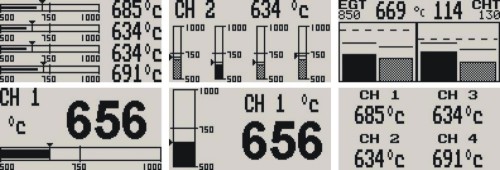
The TC-2 thermocouple display unit is a 4 channel 3 1/8” instrument that contains all the features necessary to monitor EGT’s and CHT’s. The instrument is fully programmable by the user resulting in the most flexible solution available. It contains 6 different display screens to allow easy customization. The TC-2 can be configured to group EGT’s/CHT’s to common settings or each thermocouple channel can be independently setup for temperature ranges as well as alarms and probe types.
The TC-2’s high accuracy is due to it’s built in thermocouple linearization curves and cold junction compensation techniques. Temperature probes can be common J, K or E type thermocouple probes as used in CHT or EGT sensors. Temperatures can be displayed in degrees Celsius or degrees Fahrenheit from -100ºC to 1200ºC (-148ºF to 2192ºF). Each channel also offers a programmable high alarm.
The TC-2 also records maximum temperatures reached for each channel in permanent memory.
-
6 different display modes
-
Supports J, K and E thermocouple probes
-
Temperatures can be displayed in degrees C or degrees F from -100ºC to 1200ºC (-148ºF to 2192ºF)
-
High accuracy: Built in thermocouple linearization curves and cold junction compensated
-
Records maximum temperatures reached for each channel in permanent memory
TC-3 (12 Channel thermocouple (EGT/CHT) indicator)
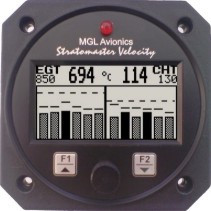
Latest Firmware Revision: 2.00
The TC-3 thermocouple display unit is a 12 channel 3
1/8” instrument that contains all the features necessary to monitor EGT’s
and CHT’s. The TC3 can be configured to display up to 12 thermocouples in
an easy to read bargraph format.
The TC-3’s high accuracy is due to it’s built in
thermocouple linearization curves and cold junction compensation
techniques. Common J, K or E type thermocouple probes are supported.
In addition the TC3 has an individual programmable
EGT and CHT alarm with an external output that can switch an external
visual alarm indicator such as a lamp. Maximum temperature for each
thermocouple is recorded in permanent memory and is also indicated by a
solid line above that thermocouples bar graph.
The TC3 also features a built in engine leaning
facility which allows the pilot to optimize the fuel mixture according to
peak EGT temperatures as well as a cruise mode facility to provide instant
identification of changing EGT/CHT trends.
Temperatures can be displayed in degrees Celsius or degrees Fahrenheit from -100ºC to 1200ºC (-148ºF to 2192ºF).
-
12 Channel thermocouple display unit
-
Supports J, K and E thermocouple probes
-
Temperatures can be displayed in degrees Celsius or degrees Fahrenheit from -100 ºC to 1200ºC (-148ºF to 2192ºF)
-
High accuracy: Built in thermocouple linearization curves and cold junction compensated
-
Maximum temperature for each thermocouple is recorded in permanent memory and indicated by a solid line above the thermocouples bar graph
-
Engine leaning function according to peak EGT temperatures
-
Engine cruise mode to instantly identify changing EGT/CHT trends
TP-2 (Dual Channel universal Temperature/Pressure gauge)
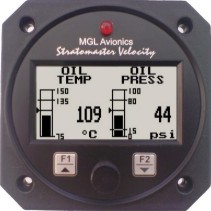
Latest Firmware Revision: 2.00
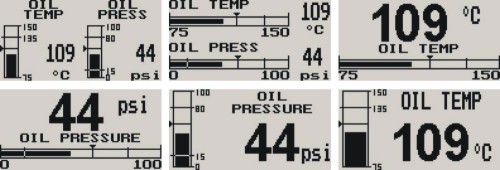
The TP-2 is a 3 1/8” dual channel temperature/pressure gauge with universal inputs that can interface to many sensors such as oil temperature, coolant temperature, oil pressure, fuel pressure, manifold pressure, boost pressure and many more.
The TP-2 gauge can be setup for a single, dual
or combination temperature / pressure display.
Temperature can be measured using standard
automotive resistive senders (e.g. VDO) as well as the MGL Avionics
precision LM335 semiconductor sensor. Pressure can be measured using
standard automotive resistive senders (e.g. VDO), Rotax 4-20mA senders as
well as 0-5V output pressure senders (e.g. UMA). In addition the
temperature and pressure inputs can be programmed to a user defined curve
for custom senders.
Both the temperature and pressure readings have a programmable low and high alarm. This results in a contact closure that is typically used to switch a warning lamp on. The TP-2 also records the maximum temperature and pressure values reached in permanent memory.
-
Dual channel universal input temperature and pressure gauge
-
Temperature can be measured using standard automotive resistive senders (e.g. VDO) as well as the MGL Avionics precision LM335 semiconductor sensor
-
Pressure can be measured using standard automotive resistive senders (e.g. VDO), Rotax 4-20mA senders as well as 0-5V output pressure senders (e.g. UMA)
-
Temperature and pressure inputs can be programmed to a user defined curve for custom senders
-
Can be setup for a single, dual or combination temperature / pressure display.
-
Both temperature and pressure readings have a programmable low and high alarm
-
Records maximum temperature and pressure reached in permanent memory
-
Supports Rotax 4-20mA pressure sender as used in 912/914 engines